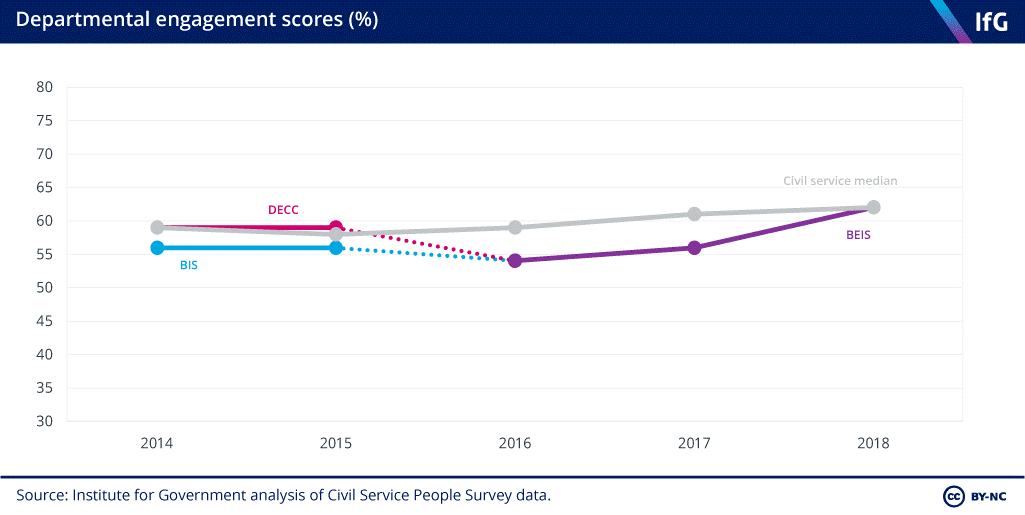Ministers should not forget the human side of rearranging departments
With department shake-ups, it is important to remember that the civil servants tasked with making the changes work are real people
With a shake-up to departments’ responsibilities on the cards, Tim Durrant says it is important to remember that the civil servants tasked with making the changes work are real people.
The prime minister is reportedly planning to rearrange or merge a number of government departments as part of an imminent Cabinet reshuffle. The Department for Exiting the EU (DExEU), one of Theresa May’s creations, will cease to exist at the end of this week, changes to the Departments for International Development and International Trade have been discussed, and the government might reshape itself to achieve its net zero emissions target.
But behind the name changes, policy relocations and ministerial turf wars, it is important to remember that these changes have a very direct impact on the lives of the people who work in the affected department – and this, in turn, has an impact on the government.
Disruption is inevitable in any organisational change
Creating, dismantling or merging departments has an inevitable cost as HR and IT systems are merged and officials move buildings – previous Institute work has estimated an upfront cost of around £15m to create a new medium-sized department.
These changes can be disruptive to officials’ day-to-day work: not knowing when you are going to get paid or where you are supposed to sit will inevitably affect how you feel about your job. When Theresa May created BEIS from DECC and BIS, the engagement scores of officials working in the new department decreased compared to the predecessor organisations, even in a year when the overall civil service score increased.

But these direct costs are dwarfed by the less tangible, but more significant, hit to productivity as ministers and civil servants work out exactly what their new roles entail. Senior officials involved in previous departmental changes, including the creation of Defra in 2001 and BEIS in 2016, estimate that this uncertainty, and the reduced productivity it causes, can last around two years.
The civil service has a lot of other things to deal with
The civil service’s to-do list is already long, without adding the extra hassle of rearranging government departments. With social care, HS2 and future relationship negotiations with the EU all requiring urgent attention, and an ambitious new government keen to make its mark, officials have plenty of demands on their time.
Adding significant changes to departmental structures will only increase the workload. Lord Butler, former cabinet secretary, recently warned: “You shouldn’t take a man’s appendix out when he’s trying to carry a piano upstairs”. Significant reforms are hard enough for civil servants to achieve without the added burden of big changes to the organisation they work in.
DExEU was always going to be temporary – but its officials’ expertise will continue to be needed
DExEU was only ever going to exist for a limited time – the clue was in the name. Following the election result the government confirmed that the department would cease to exist at 11pm on 31 January, the moment the UK leaves the EU. But it is not certain what this means for the DExEU staff who have spent the last few years working – including many late nights in the office and extra weekend shifts – to prepare the UK for Brexit.
Just because the department will be wound up does not mean the Brexit job is done. The vital functions of DExEU – supporting negotiations, co-ordinating legislation and overseeing the hundreds of projects underway to get the country ready for the end of transition – still exist.
Theresa May’s rapid creation of the department was designed to show that she was serious about leaving the EU. The fallout from this standing start caused the government headaches throughout the first months and years of Brexit, and now it could repeat the same mistake by rapidly dismantling the department without a clear plan.
One option would be to fold the department, its functions and most of its officials into the Cabinet Office, but the government appears set to scatter civil servants across Whitehall – a needless loss of expertise and morale. The prime minister still needs civil servants to work around the clock to deliver his Brexit promises, so his government should show that it recognises and values the hard work and achievements of the DExEU officials currently facing an uncertain future.
Changes to departments’ responsibilities are not a bad thing – but need to be managed properly
The fact that these changes are disruptive – to individuals and to the wider organisations – is not, on its own, a sufficient reason not to make them. But as we have previously recommended, the government must have a clear rationale for rearranging departments. This is particularly true given the people who will have to make the new setup work are also directly affected by those changes.
- Supporting document
- creating-and-dismantling-government-departments.pdf (PDF, 527.58 KB)
- Topic
- Civil service Ministers Brexit
- Keywords
- Machinery of government
- Administration
- Johnson government
- Department
- Department for Exiting the European Union
- Publisher
- Institute for Government